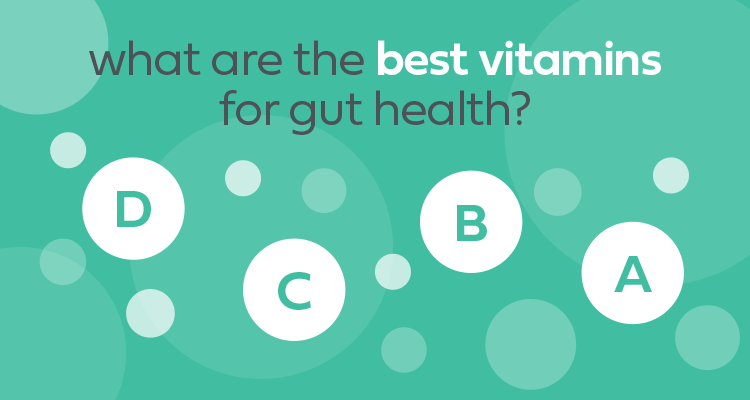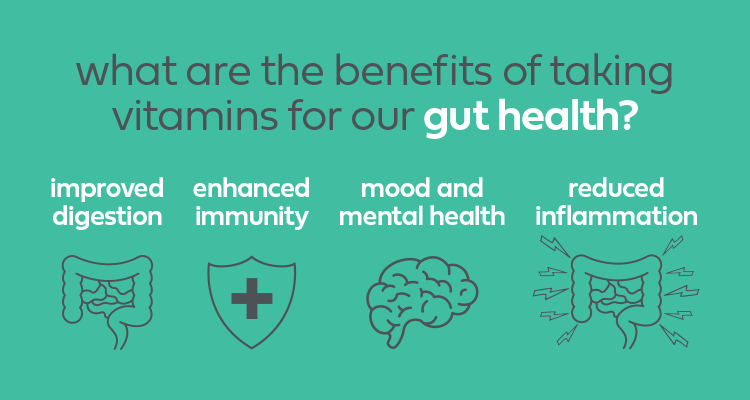Best vitamins for gut health

We all (hopefully) know by now that maintaining good gut health is essential for overall well being, and one way to support your gut is by ensuring you’re getting the right vitamins and nutrients it needs. Which is why in this week’s expert series we’re exploring the benefits of taking vitamins for gut health, focusing on which vitamins exactly to prioritise and how to incorporate them into your diet through food and supplements. We also take a look at our aguulp for gut supplement and uncover the vitamins it contains and how they benefit your gut and overall health.
What are the benefits of taking vitamins for our gut health?
Before diving into specific vitamins, it’s important to understand why taking vitamins is actually beneficial for our gut health:
Improved digestion: Certain vitamins aid in the breakdown of food and nutrient absorption. A healthy gut ensures that the nutrients from the food you eat are properly absorbed and utilised by your body.
Enhanced immunity: A well-balanced gut promotes a robust immune system – roughly 70% of our immune system resides in our gut. Vitamins help in maintaining a harmonious balance of gut bacteria, which plays a crucial role in protecting against harmful pathogens.
Read more about the relationship between gut health and our immune system in detail in our blog titled ‘what’s the link between gut health and immune system’
Mood and mental health: The gut-brain connection is well-documented and important one at that too. Certain vitamins can influence neurotransmitter production and research has shown that a healthy gut can positively impact your mood and overall mental well being.
To understand the gut-brain axis further, read our blog titled ‘the link between gut health and mental health’
Reduced inflammation: Inflammation in the gut can lead to various health issues. Certain vitamins possess anti-inflammatory properties that can help reduce gut inflammation.
Read more about gut inflammation in our blog titled ‘how to heal gut inflammation’.

The best vitamins for gut health
Vitamin D: Often called the sunshine vitamin, vitamin D is crucial for gut health. It helps in maintaining a balanced gut microbiome and reducing inflammation.
Vitamin C: This antioxidant vitamin supports a healthy gut lining and plays a role in collagen production, which is essential for gut repair.
Vitamin B Complex: B vitamins, such as B1, B2, B3, B6, and B12, are essential for a well-functioning gut. They aid in energy metabolism and support a healthy nervous system.
Vitamin A: Vitamin A promotes mucus production in the gut, which acts as a protective barrier. It also supports immune function.
Vitamin K: This vitamin plays a role in gut health by promoting the growth of beneficial gut bacteria and regulating inflammation.
Now you might be thinking, how do I incorporate these vitamins into my day-to-day routine? Food and supplementation is your answer. Certain foods are a great source of the vitamins mentioned like:
- Fibre-rich foods: Whole grains, beans, lentils, and fruits and vegetables with skin provide dietary fibre that nourishes gut bacteria. Beans and legumes are also an excellent source of B vitamins, especially folate (B9). Folate aids in DNA synthesis and repair, benefiting overall gut function.
- Omega-3 fatty acids: Fatty fish like salmon, walnuts, and flaxseeds contain omega-3s, which have been shown to reduce inflammation and support gut health.
- Colourful fruits and vegetables: A variety of colourful fruit and veg ensures you get a range of vitamins and antioxidants for overall health, including gut health. Examples of foods include (but are not limited to):
- Citrus fruits: oranges and grapefruits for example are high in vitamin C
- Sweet potatoes: Rich in vitamin A.
- Leafy greens: like spinach and kale are packed with vitamin K,
- Berries: like blueberries and strawberries are not only rich in vitamin C but also contain dietary fibre
While obtaining vitamins through a balanced diet is ideal, it is sometimes not possible to incorporate all the foods listed above due factors such as dietary restrictions or health conditions, which is where supplements can be beneficial.

What aguulp supplement would we recommend?
It may seem pretty obvious that we’d recommend our aguulp for gut supplement as it has been specifically formulated with the gut in mind, however taking everything into consideration with what’s been covered in this blog, we would highly recommend our aguulp for gut and immunity dual pack.
If you’re looking to improve your overall gut health AND would like to ensure you’re getting the vitamins you need then this is your answer. When taken together, you’re providing your body with prebiotic fibres to feed your good gut bacteria and you’re also providing your body with 8+ key vitamins and minerals to support your overall gut and immune function.
References:
Ahmed, R., & Gray, D. (1996). Immunological memory and protective immunity: understanding their relation. Science, 272(5258), 54-60.
Cooper, G. S., Stroehla, B. C. (2003). The epidemiology of autoimmune diseases. Autoimmunity Reviews, 2(3), 119-125.
Belkaid, Y., & Hand, T. W. (2014). Role of the microbiota in immunity and inflammation. Cell, 157(1), 121-141.
Clemente, J. C., Ursell, L. K., Parfrey, L. W., & Knight, R. (2012). The impact of the gut microbiota on human health: an integrative view. Cell, 148(6), 1258-1270.
Pham VT, Dold S, Rehman A, Bird JK, Steinert RE. Vitamins, the gut microbiome and gastrointestinal health in humans. Nutr Res. 2021 Nov;95:35-53. doi: 10.1016/j.nutres.2021.09.001. Epub 2021 Oct 21. PMID: 34798467.
Peterson CT, Rodionov DA, Osterman AL, Peterson SN. B Vitamins and Their Role in Immune Regulation and Cancer. Nutrients. 2020 Nov 4;12(11):3380. doi: 10.3390/nu12113380. PMID: 33158037; PMCID: PMC7693142.
Mohajeri MH, Brummer RJM, Rastall RA, Weersma RK, Harmsen HJM, Faas M, Eggersdorfer M. The role of the microbiome for human health: from basic science to clinical applications. Eur J Nutr. 2018 May;57(Suppl 1):1-14. doi: 10.1007/s00394-018-1703-4. PMID: 29748817; PMCID: PMC5962619.
Gilbert C. What is vitamin A and why do we need it? Community Eye Health. 2013;26(84):65. PMID: 24782580; PMCID: PMC3936685.
Silva MC, Furlanetto TW. Intestinal absorption of vitamin D: a systematic review. Nutr Rev. 2018 Jan 1;76(1):60-76. doi: 10.1093/nutrit/nux034. PMID: 29025082.
Strandwitz P. Neurotransmitter modulation by the gut microbiota. Brain Res. 2018 Aug 15;1693(Pt B):128-133. doi: 10.1016/j.brainres.2018.03.015. PMID: 29903615; PMCID: PMC6005194.
Mohammadi AA, Jazayeri S, Khosravi-Darani K, Solati Z, Mohammadpour N, Asemi Z, Adab Z, Djalali M, Tehrani-Doost M, Hosseini M, Eghtesadi S. The effects of probiotics on mental health and hypothalamic-pituitary-adrenal axis: A randomized, double-blind, placebo-controlled trial in petrochemical workers. Nutr Neurosci. 2016 Nov;19(9):387-395. doi: 10.1179/1476830515Y.0000000023. Epub 2015 Apr 16. PMID: 25879690.



